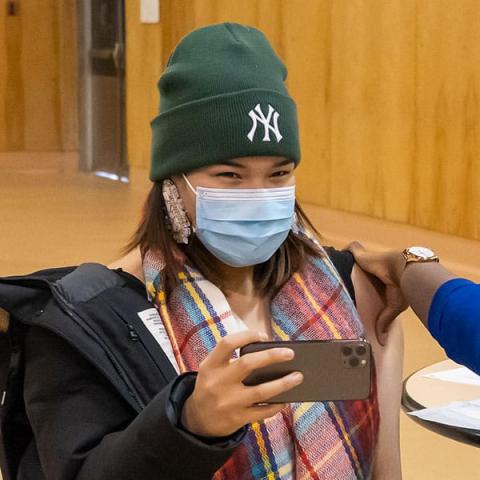Infections: How can we prevent and treat them?
Precautionary measures are safety steps you can take to prevent getting or spreading infectious diseases. When we follow them, we help keep the circle of protection strong for ourselves and our community.
Treatment depends on the type of infection.
How can we prevent infections?
Some measures are general (“universal”) and work effectively to reduce the spread of most kinds of bacteria, viruses, parasites, and fungi, like:
- Washing your hands with soap and warm water for at least 20 seconds
- Staying home and avoiding other people when you are sick
- Covering your mouth with your elbow or a tissue when you cough or sneeze
- Treating tap water in communities to remove natural germs
- Boiling drinking or cooking water from rivers or lakes while at camp
- Safely handling food, like butchering animals with a clean knife and cooking the meat thoroughly
- Ventilating indoor spaces well

Routine vaccination is very important to prevent infections
Did you know?
- Vaccinations help teach your body’s immune system to protect your body from specific germs.
- They are the most effective prevention for many potentially serious infections and have saved many people’s lives in Eeyou Istchee and around the world.
- Most routine vaccines can help your body protect you from ever getting a specific infection. Some help your body prevent severe symptoms of illnesses, but don’t always fully stop an infection.
- It is important to stay up to date on your routine vaccines (like pneumonia, measles, COVID-19, tetanus, influenza, meningitis, hepatitis, chickenpox, shingles, etc.).
Some prevention measures are more specific to certain infections
Other prevention measures depend on the specific ways that different infections are transmitted. For example, someone may be at higher risk of getting infected by a specific disease depending on their job, travel, or medical conditions.
Some examples include:
- Practicing safe sex to reduce transmitting sexually transmitted and blood-borne diseases (STBBIs), like chlamydia or HIV (for example, using condoms and getting screening tests regularly)
- Getting specific vaccines based on your work or travel (for examples, a rabies vaccine for people who work directly with animals)
- Wearing masks when recommended to prevent spreading or breathing in respiratory germs
- Using additional personal protective equipment (gloves, gowns, visors, N95 respirators, etc.) in specific settings or jobs
- Preventive medications for people who have a very high risk of exposure (like PrEP for HIV)
How are infections treated?
Treatment depends on the type of infection.
An infection can be caused by a bacteria, virus, parasite, or fungi.
- Bacterial infections are caused by bacteria – micro-organisms that live in many different types of environments
- Bacteria can live and multiply on their own. They can be in water, soil, food, on plants, animals, even on top of our skin. When they get into a place where they aren’t normally (like inside of our skin from a knife cut, or into our gut from being eaten) they can grow and make us sick
- Some examples include salmonella, strep throat or a urinary tract infection (also called a “bladder infection”)
- Most bacterial infections can be treated with antibiotics from your doctor
- There are different kinds of antibiotics that are used to help treat different bacteria
- There are also several vaccines to prevent some specific bacterial infections (for example, tetanus and pneumonia)
- Viral infections are caused by viruses
- Viruses are much smaller than bacteria
- Viruses usually need to be inside of another living thing to be able to grow and spread. Viruses can sometimes survive on their own for a short time on a contaminated surface (like a knife or table), but usually not for more than a couple of days
- Some examples of viral infections include chickenpox and the common cold
- Many viral infections do not have specific medical treatment to cure them. Your body’s immune system usually fights these infections on its own, though this takes time
- Staying hydrated, and using medications like Tylenol to reduce symptoms like pain, fever and muscle aches can help people feel less sick
- Often, your doctor may tell you to wait out a viral infection
- For a few viruses, a doctor may prescribe specific antiviral treatment. There are only a small number of viruses that have specific medications
- We also have vaccines to prevent quite a few viruses, like hepatitis B, influenza, measles and chickenpox
- Many viruses (like common colds) do not have vaccines
- Parasitic infections are caused by parasites
- Parasites can vary in size, but are usually larger than bacteria and can sometimes even be visible to the naked eye
- Parasites usually live on or in another living being and survive by pulling nutrients out of it
- They often produce tiny eggs that can be transferred to another living being in contaminated water or by direct contact
- Common examples of parasites that can infect humans include giardia, pinworm, and scabies
- Many parasites that cause human infection are more common in tropical areas of the world
- There are specific medications for different specific parasitic infections
- Fungal infections are caused by fungi
- Fungi are usually larger than bacteria
- These can vary in size, from microscopic to visible to the naked eye (like mould on bread)
- Many fungi, like mushrooms we find in the wild, are not infectious
- Common examples of fungi that can infect humans are ringworm, athlete’s foot and vaginal yeast infections
- There are specific medications for specific fungal infections
Explore more about Infections

Infections happen when germs enter someone’s body, and start to make the person sick.


